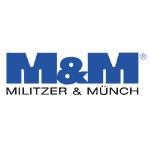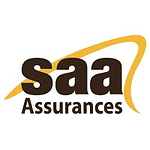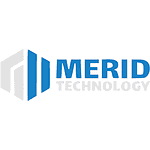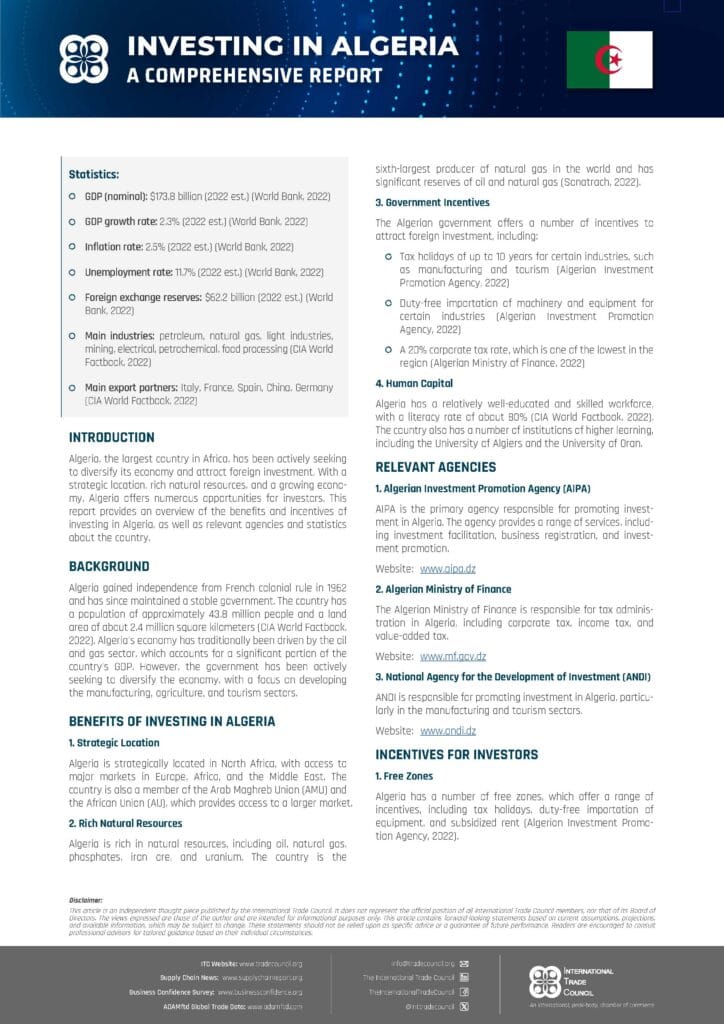- Type of Government: Presidential Republic
- Population: Approximately 44 million
- GDP: Around $168 billion USD
- Corporate Tax Rate: 26%
- Personal Income Tax Rate: Progressive, up to 35%
- Major Exports: Petroleum, natural gas, petroleum products
- Major Imports: Machinery, foodstuffs, consumer goods
Doing Business with Algeria
A comprehensive guide to doing business, exporting, investing, and manufacturing in Algeria
Exporting goods to Algeria involves several important steps. Below is a detailed guide:
-
Market Research
- Conduct research to understand the demand and competition for your products in Algeria.
-
Verify Product Eligibility
- Ensure your products comply with Algerian import regulations and standards.
-
Find a Local Partner or Distributor
- Establish a relationship with a local distributor or partner to facilitate market entry.
-
Prepare Required Documentation
- Commercial Invoice
- Packing List
- Certificate of Origin
- Bill of Lading or Airway Bill
- Any additional certificates required for specific goods
-
Understand Customs Procedures
- Familiarize yourself with Algerian customs regulations. Visit the Algerian Customs Authority: Algerian Customs.
-
Comply with Labeling Requirements
- Ensure that product labels meet Algerian standards, including language and content.
-
Arrange Shipping and Logistics
- Choose a reliable freight forwarder experienced in Algerian shipments.
-
Calculate Duties and Taxes
- Be aware of applicable import duties and VAT. This information is crucial for pricing.
-
Insurance
- Obtain insurance to cover the goods during transit.
-
Track Shipment and Documentation
- Monitor the shipment and ensure all documentation is in order for customs clearance.
Key Contacts and Resources
- Algerian Customs Authority
- Website: Algerian Customs
- Ministry of Commerce
- Website: Ministry of Commerce
- Algerian Chamber of Commerce and Industry (CACI)
- Website: CACI
Importing goods into Algeria involves several steps and requires interaction with various government agencies. Below is a detailed guide:
-
Register Your Business
- Ensure your business is registered with the Algerian government. This is necessary to engage in international trade.
-
Get an Import License
- Apply for an import license from the Ministry of Commerce.
- Visit Ministry of Commerce for more details.
-
Classify Your Goods
- Determine the Harmonized System (HS) code for your products. This code is crucial for tariff classification.
-
Check Prohibited and Restricted Items
- Consult the latest list of prohibited and restricted items to ensure your goods are allowed.
- Information can be found on the Customs Authority website.
-
Arrange for Shipping
- Select a reliable freight forwarder to handle the transportation of goods to Algeria.
-
Prepare Required Documentation
- Commercial Invoice
- Packing List
- Bill of Lading or Airway Bill
- Certificate of Origin
- Import License
- Any additional certificates required for specific goods
-
Customs Declaration
- Submit a customs declaration through the Algerian Customs’ online system.
- Visit Algerian Customs for the declaration process.
-
Pay Duties and Taxes
- Calculate and pay any applicable import duties and VAT. Rates vary depending on the goods.
-
Goods Inspection
- Your goods may be subject to inspection by Algerian Customs. Ensure all documentation is accurate to avoid delays.
-
Receive Your Goods
- Once cleared, coordinate with your freight forwarder to receive and distribute your goods.
Key Contacts and Resources
- Ministry of Commerce
- Website: Ministry of Commerce
- Provides guidelines on import licenses and trade regulations.
- Algerian Customs Authority
- Website: Algerian Customs
- Offers information on customs procedures, tariffs, and prohibited items.
- Ministry of Finance
- Website: Ministry of Finance
- Oversees tax and financial regulations related to imports.
Incorporating a company in Algeria involves several steps. Here is a comprehensive guide:
-
Choose a Business Structure
- Decide the type of company: Limited Liability Company (SARL), Joint Stock Company (SPA), etc.
-
Check Name Availability
- Verify that your desired company name is available.
- Visit the National Center of the Commercial Register (CNRC) website: CNRC.
-
Draft the Articles of Association
- Prepare the Articles of Association with the help of a legal advisor.
-
Notarize the Documents
- Have the Articles of Association notarized by a public notary.
-
Deposit Capital in a Bank
- Open a bank account in the company’s name and deposit the required minimum capital.
- Obtain a certificate of deposit from the bank.
-
Register with the CNRC
- Submit the notarized documents and bank certificate to the CNRC.
- Pay the registration fee, which varies based on company size and type.
-
Publish a Legal Notice
- Announce the company formation in a national legal journal.
-
Obtain a Tax Identification Number (NIF)
- Register with the tax authorities to get a NIF.
-
Register for Social Security
- Enroll with the National Social Insurance Fund for Workers (CNAS).
-
Obtain Necessary Licenses and Permits
- Depending on your business activity, acquire any specific licenses or permits.
Estimated Costs
- Notary Fees: Varies depending on the complexity of the documents.
- Registration Fees: Depends on the company’s capital and structure.
- Publication Costs: Costs for publishing the legal notice in a journal.
Key Contacts and Resources
- National Center of the Commercial Register (CNRC)
- Website: CNRC
- Provides registration services and business name verification.
- Ministry of Finance
- Website: Ministry of Finance
- Oversees tax registration.
- National Social Insurance Fund for Workers (CNAS)
- Website: CNAS
- Manages social security registration.
Setting up a manufacturing plant in Algeria involves several key steps and interactions with government agencies. Below is a detailed guide:
-
Conduct Market Research
- Analyze market demand, competition, and feasibility.
-
Choose a Suitable Location
- Select an industrial zone or location with necessary infrastructure.
-
Incorporate Your Company
- Follow the steps to incorporate a company in Algeria. Refer to the National Center of the Commercial Register (CNRC): CNRC.
-
Obtain Necessary Permits and Licenses
- Apply for construction and operational permits from local authorities.
-
Secure Financing
- Arrange funding through banks or investors. Consider local incentives for manufacturing.
-
Design the Facility
- Hire architects and engineers to design the plant according to regulatory standards.
-
Construction and Equipment Installation
- Oversee the construction and procurement of machinery.
-
Compliance with Environmental and Safety Standards
- Ensure the plant meets environmental regulations and safety standards.
- Contact the Ministry of Environment: Ministry of Environment.
-
Hire and Train Employees
- Recruit skilled labor and provide necessary training.
-
Register for Taxes and Social Security
- Obtain a Tax Identification Number (NIF) and register with the National Social Insurance Fund for Workers (CNAS).
-
Start Production
- Begin manufacturing operations and monitor quality control.
Key Contacts and Resources
- National Center of the Commercial Register (CNRC)
- Website: CNRC
- Ministry of Industry and Mines
- Website: Ministry of Industry
- Provides support and information on industrial policies.
- Ministry of Environment
- Website: Ministry of Environment
- Offers guidelines for environmental compliance.
- National Social Insurance Fund for Workers (CNAS)
- Website: CNAS
Registering a trademark in Algeria involves several steps and interactions with relevant authorities. Here’s a concise guide:
-
Conduct a Trademark Search
- Perform a search to ensure your trademark is unique and not already registered.
- Visit the Algerian National Institute of Industrial Property (INAPI) for guidance: INAPI.
-
Prepare Your Application
- Gather necessary details: trademark representation, list of goods/services, and applicant information.
-
Submit the Application
- File the application with INAPI, either online or in person.
- Include all required documents and pay the application fee.
-
Application Examination
- INAPI will examine the application for compliance with legal requirements.
-
Publication and Opposition
- If approved, the trademark is published in the official bulletin for opposition.
- There is a period during which third parties can oppose the registration.
-
Registration and Certificate Issuance
- If no oppositions are filed, INAPI registers the trademark and issues a registration certificate.
Estimated Costs
- Application Fee: Varies based on the number of classes and specifics of the trademark.
Key Contacts and Resources
- Algerian National Institute of Industrial Property (INAPI)
- Website: INAPI
- Provides resources and support for trademark registration.
Resolving commercial disputes in Algeria involves several steps and may require interaction with legal bodies. Here’s a detailed guide:
-
Negotiation
- Attempt to resolve the dispute directly with the other party through negotiation.
-
Mediation or Arbitration
- Consider alternative dispute resolution methods like mediation or arbitration.
- Contact the Algerian Chamber of Commerce and Industry (CACI) for mediation services: CACI.
-
Engage Legal Representation
- If mediation fails, hire a lawyer experienced in Algerian commercial law.
-
File a Lawsuit
- File a case in the competent commercial court. Ensure all documentation and evidence are prepared.
-
Court Proceedings
- Attend court hearings and present your case.
- The court will review evidence and witness testimonies.
-
Judgment and Enforcement
- Await the court’s decision. If favorable, enforce the judgment through legal channels.
Estimated Costs
- Legal Fees: Varies depending on the complexity of the case and lawyer’s rates.
- Court Fees: Generally based on the value of the dispute.
Key Contacts and Resources
- Algerian Chamber of Commerce and Industry (CACI)
- Website: CACI
- Offers mediation and arbitration services.
- Ministry of Justice
- Website: Ministry of Justice
- Provides information on the legal system and court procedures.
When considering doing business in Algeria, it’s important to understand various social, cultural, political, and economic factors. Here’s an overview:
Social and Cultural Factors
- Language: Arabic is the official language, with French widely used in business.
- Business Etiquette: Building personal relationships is crucial. Meetings often begin with casual conversation.
- Religion: Islam influences business practices. Be mindful of prayer times and religious holidays.
Political Environment
- Government Structure: Algeria has a presidential system. Political stability is generally maintained, but changes in policy can occur.
- Regulations: Businesses must comply with local regulations, which can be complex.
Economic Factors
- Foreign Exchange: The Algerian Dinar (DZD) is the local currency. Exchange rates can fluctuate, impacting costs and pricing.
- Investment Opportunities: The government encourages foreign investment, especially in sectors like energy and infrastructure.
Rule of Law
- Legal System: Based on French civil law. Contract enforcement can be slow, so legal support is advisable.
- Intellectual Property: Protecting IP is important; registration with INAPI is recommended.
Other Considerations
- Infrastructure: Varies across regions. Major cities have better facilities.
- Corruption: Transparency International ranks Algeria as moderately corrupt. Due diligence is essential.
Useful Resources
- Algerian Chamber of Commerce and Industry: CACI
- Ministry of Commerce: Ministry of Commerce
- National Center of the Commercial Register: CNRC
- Algerian National Institute of Industrial Property: INAPI
Ask our Experts on Doing Business in/with Algeria
If you’re looking to do business or invest in Algeria, we can provide expert guidance, market insights, and valuable connections to help you navigate the local landscape. Contact us today to discover how we can assist in making your venture a success.

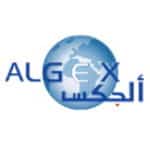
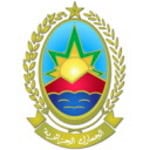
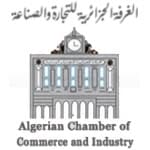
 Tel: +213 23 50 52 00
Tel: +213 23 50 52 00